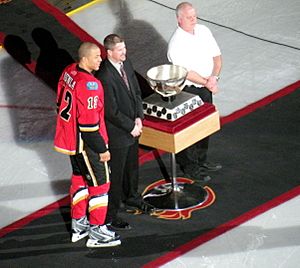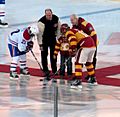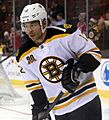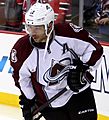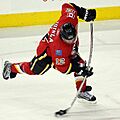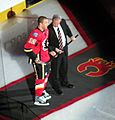Jarome Iginla facts for kids
Quick facts for kids Jarome Iginla |
|||
|---|---|---|---|
| Hockey Hall of Fame, 2020 | |||
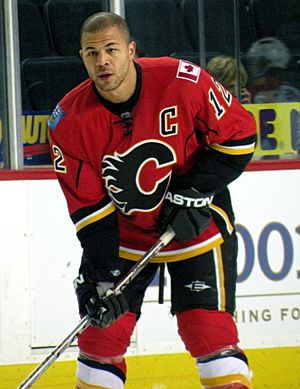
Iginla with the Calgary Flames in December 2008
|
|||
| Born | July 1, 1977 Edmonton, Alberta, Canada |
||
| Height | 6 ft 1 in (185 cm) | ||
| Weight | 210 lb (95 kg; 15 st 0 lb) | ||
| Position | Right Wing | ||
| Shot | Right | ||
| Played for | Calgary Flames Pittsburgh Penguins Boston Bruins Colorado Avalanche Los Angeles Kings |
||
| National team | |||
| NHL Draft | 11th overall, 1995 Dallas Stars |
||
| Playing career | 1996–2017 | ||
Jarome Iginla (born July 1, 1977) is a Canadian former professional ice hockey player. He was a winger and played over 1,500 games in the National Hockey League (NHL). He played for the Calgary Flames, Pittsburgh Penguins, Boston Bruins, Colorado Avalanche, and Los Angeles Kings between 1996 and 2017. Many people think he is one of the best players of his time.
In his younger years, Iginla played for the Kamloops Blazers in junior hockey. He helped them win two Memorial Cup championships. He was also named the best player in the Western Hockey League (WHL) in 1996. The Dallas Stars picked him 11th overall in the 1995 NHL Draft. However, he was traded to the Calgary Flames before he even played his first NHL game.
Nicknamed "Iggy", he was a top scorer in the NHL. In the 2001–02 season, he led the league in goals and points. He also won the Lester B. Pearson Award as the most outstanding player, chosen by other players. In 2003–04, Iginla led the league in goals again. He was the captain of the Flames and led them to the Stanley Cup Finals. He scored the most goals in the playoffs that year.
Iginla was chosen for the NHL All-Star Game six times. He holds the Calgary Flames' team records for most goals, points, and games played. He is also second in assists for the Flames. Iginla scored 50 goals in a season twice. He is one of only seven players in NHL history to score 30 goals in 11 seasons in a row. He is also one of 20 players to score over 600 goals in the NHL. He is one of 34 players to get over 1,300 points in his career. He won the Mark Messier Leadership Award for his leadership. The Flames and the league also recognized him for his community work. While playing for the Flames, Iginla gave $2,000 to the Kidsport charity for every goal he scored. The Flames retired his jersey number 12 in a special ceremony on March 2, 2019.
Iginla played for Team Canada many times. He won championships at the 1996 World Junior and 1997 World Championships. He also won the 2004 World Cup of Hockey. He played in three Olympic Games and won two gold medals. This includes the 2002 Winter Olympics. There, he helped Canada win its first Olympic hockey championship in 50 years.
Iginla was chosen for the Hockey Hall of Fame in 2020. This was his first year of being eligible. He is the fourth Black player to be inducted.
Contents
Early Life and Family
Iginla was born in Edmonton, Alberta, Canada. He grew up in the nearby city of St. Albert. His father, a lawyer, was from Nigeria. His last name, Iginla, means "big tree" in Yoruba, his father's native language. Iginla's mother, Susan Schuchard, is from Oregon. She worked as a massage therapist and music teacher. Iginla was raised by his mother and grandparents after his parents divorced when he was two years old.
Besides hockey, Iginla also played baseball when he was young. He was the catcher for the Canadian national junior team. Baseball was his favorite sport before hockey. He played baseball until he was about 17. He later said he hoped to be a professional in both sports, like Bo Jackson.
Iginla gives credit to his grandfather for his hockey career. His grandfather helped him play sports at a high level. Iginla looked up to other Black hockey players, like Edmonton Oilers goaltender Grant Fuhr. Iginla played goalie for his first two years of hockey. Then he switched to right wing. He played all his minor hockey in St. Albert. At 15, he led his league in scoring with 87 points.
Playing Career Highlights
Junior Hockey Success
Iginla played three years for the Kamloops Blazers in the Western Hockey League (WHL). In 1993–94, at 16, he had 29 points in 48 games. The Blazers won the league title and the 1994 Memorial Cup, which is Canada's national junior championship.
In 1994–95, Iginla scored 33 goals and 71 points. The Blazers won the league championship again. They also won their second straight national championship at the 1995 Memorial Cup. Iginla scored five goals in the tournament. He also won the George Parsons Trophy as the most sportsmanlike player.
The Dallas Stars picked Iginla 11th overall in the 1995 NHL Draft. But on December 20, 1995, they traded him to the Calgary Flames. This trade happened before he played his first NHL game.
In his last season in Kamloops (1995–96), Iginla was fourth in league scoring with 136 points. He scored 63 goals in 63 games. He won the Four Broncos Memorial Trophy as the WHL's best player. He also played for Team Canada at the 1996 World Junior Ice Hockey Championships. He led that tournament in scoring with 12 points. Canada won its fourth gold medal in a row.
Becoming a Calgary Flames Star
Iginla made his NHL debut in the 1996 playoffs. He joined the Flames right after his junior season ended. He played two games against the Chicago Blackhawks. He was the first 18-year-old to play for the Flames since 1983. In his first game, he got his first point with an assist. He scored his first goal in his second game.
He played his first full NHL season in 1996–97. He was named to the NHL All-Rookie Team. He finished second for the Calder Memorial Trophy as rookie of the year. He led all first-year players with 50 points. By his third season (1998–99), Iginla led the Flames with 28 goals. He continued to improve, scoring 29 goals and 63 points in 1999–2000. The next season, he had 31 goals and 71 points.
In the 2001–02 season, Iginla became a superstar. He scored 52 goals and 96 points. He won the Art Ross Trophy for leading the league in points. He also won the Maurice "Rocket" Richard Trophy for leading in goals. He was also given the Lester B. Pearson Award as the league's most valuable player, voted by his fellow players.
In 2003–04, Iginla was named the 18th captain in Flames history. He was the first Black captain in NHL history. He won his second Rocket Richard Trophy, scoring 41 goals. The Flames made the playoffs for the first time in eight years. Iginla led all playoff scorers with 13 goals. He captained the Flames to the Stanley Cup Finals. They lost to the Tampa Bay Lightning in seven games.
After the 2004–05 NHL lockout, Iginla helped improve the game. On December 7, 2006, he reached 300 career goals and 600 career points. He missed some games in 2006–07 due to a knee injury. Still, he scored 94 points, including a career-high 55 assists.
In 2007–08, Iginla had his second 50-goal season. He also had 48 assists for a career-high 98 points. He broke the Flames' record for games played (804th game) and goals (365th goal). He signed a five-year contract extension with the Flames.
Iginla reached 800 career points in December 2008. On March 1, 2009, he passed Theoren Fleury to become the Flames' all-time leading scorer. He also scored his 400th career goal in that game. He finished the season with 35 goals and 89 points.
On January 30, 2010, Iginla reached 900 career points. Six nights later, he played his 1,000th career game. The Flames missed the playoffs that year. Iginla took responsibility for the team's struggles.
In the 2010–11 season, Iginla reached more milestones. He recorded his 500th career assist on January 11, 2011. He scored his 30th goal of the season on March 6. This made him the 10th player to score at least 30 goals in ten seasons in a row. A month later, he scored his 1,000th career point on April 1. He ended the season with 43 goals and 86 points.
Iginla scored his 500th goal on January 7, 2012. He was the 42nd player in league history to do this. He was also the 15th to do it with one team. He scored his 30th goal of the 2011–12 season on March 13, 2012. This made him the seventh player to score 30 goals in 11 seasons in a row.
Later Career: Pittsburgh, Boston, Colorado, and Los Angeles
In 2012–13, with the Flames struggling, Iginla was traded. On March 27, 2013, he was sent to the Pittsburgh Penguins. The Flames received a first-round draft pick and two college prospects. Iginla said playing with stars like Sidney Crosby and Evgeni Malkin influenced his decision. The Penguins lost to the Boston Bruins in the Eastern Conference Finals.
After that season, Iginla became a free agent. He signed a one-year contract with the Boston Bruins. He scored his first goal as a Bruin in his ninth game. He returned to Calgary on December 10, 2013. Fans gave him a long standing ovation. He recorded his 600th career assist on February 4, 2014.
The Bruins could not re-sign Iginla due to salary rules. So, he signed a three-year contract with the Colorado Avalanche. He led the team with 29 goals in 2014–15, but the Avalanche missed the playoffs. On January 4, 2016, Iginla became the 19th player in NHL history to score 600 career goals. On December 10, 2016, he played in his 1,500th NHL game. He is the 16th player to reach this milestone.
On March 1, 2017, Iginla was traded to the Los Angeles Kings. He chose to wear number 88. When he was 10, he had bought a Kings jersey and put his name and number 88 on it after Wayne Gretzky joined the team.
Iginla was not re-signed by the Kings for the 2017–18 season. He had hip surgery in late 2017. On July 30, 2018, Iginla announced his retirement from hockey.
On June 24, 2020, Iginla was chosen for the Hockey Hall of Fame. This was in his first year of being eligible.
International Play for Canada
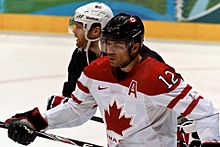 Iginla won gold medals at the Olympics in 2002 and 2010. |
||
| Medal record | ||
|---|---|---|
| Representing |
||
| Men's ice hockey | ||
| Olympic Games | ||
| Gold | 2002 Salt Lake City | |
| Gold | 2010 Vancouver | |
| World Championship | ||
| Gold | 1997 Finland | |
| World Cup | ||
| Gold | 2004 World Cup of Hockey | |
| World Junior Championship | ||
| Gold | 1996 USA | |
Iginla first played for Canada in 1994 at the Nations Cup. He led Canada in scoring with nine points as they won the gold medal. Two years later, he played for the national junior team at the 1996 World Junior Ice Hockey Championships. He led the tournament in scoring with 12 points. Canada won its fourth gold medal in a row. He was named an all-star and the tournament's best forward.
In 1997, Iginla played in his first tournament with the senior team. He was 19 years old and the youngest player. He helped Canada win the gold medal at the 1997 World Championships.
Iginla joined Team Canada for the 2002 Winter Olympics. He scored two goals in the gold medal game, a 5–2 win over the United States. Canada won its first Olympic gold medal in 50 years. Iginla became the first Black man to win a gold medal at the Winter Olympics. He also played for Canada at the 2004 World Cup of Hockey and won gold.
Iginla played in his second Olympics in 2006 in Turin. Canada did not win gold that year. He was an alternate captain again for the 2010 team in Vancouver. He scored a hat trick against Norway to start the tournament. He led the tournament with five goals. He also assisted on Sidney Crosby's winning goal in overtime against the United States in the gold medal final.
Playing Style and Leadership
In his best years, Iginla was known as a strong power forward. He wanted to play like players who combined skill and physical play. He was one of the most consistent scorers in the league.
Iginla became more physical in his play. He accepted that he needed to be more aggressive to improve. He was most effective when he had space to move. To create that space, he sometimes had to challenge his opponents. Teammates said he would fight, hit, and score goals. Opponents respected his all-around play.
Iginla had several "Gordie Howe hat tricks." This means he had a fight, a goal, and an assist in the same game. His fights often motivated his team. He sometimes got injured from fighting, like a broken hand in 2003. His tough style of play was praised by hockey commentator Don Cherry.
Iginla earned the respect of other players. He was known for leading by example, not by being loud. He liked to talk to players one-on-one to make sure they were comfortable. He won the Mark Messier Leadership Award in 2009.
Personal Life and Community Work
Iginla is married to his high school sweetheart, Kara. They have three children: a daughter named Jade and two sons named Tij and Joe. Jade plays hockey for Brown University. Tij plays for the Kelowna Rockets and was a high draft pick in 2024. Joe plays for the Edmonton Oil Kings.
Iginla is a Christian. He has spoken about his faith in Jesus. He is also known for being kind-hearted. A former general manager said he was a better person than he was a player. In 2002, at the Olympics, Iginla paid for a hotel room for four fans who were sleeping in their car.
Since 2002, he has run the Jarome Iginla Hockey School in Calgary. It is a non-profit organization. The money raised goes to the Diabetes Research Association. In 2004, he won the NHL Foundation Player Award for his community service. He also won the King Clancy Memorial Trophy for his humanitarian work.
Iginla supports many charities. Since 2000, he donated money to KidSport for every goal he scored. Between 2000 and 2013, he donated over $700,000 from this effort.
Iginla is a part owner of the Kamloops Blazers, his former junior team. He bought a share in the team in 2007 with other NHL players. He is also an ambassador for the NHL Diversity program. This program helps kids from less fortunate backgrounds play hockey. He has also been a spokesperson for Scotiabank and Samsung Canada.
He was the cover athlete for the EA Sports video game NHL 2003. After retiring, Iginla has lived in Chestnut Hill, Massachusetts and Lake Country, British Columbia.
Career Statistics
| Regular season | Playoffs | |||||||||||||
|---|---|---|---|---|---|---|---|---|---|---|---|---|---|---|
| Season | Team | League | GP | G | A | Pts | PIM | GP | G | A | Pts | PIM | ||
| 1993–94 | Kamloops Blazers | WHL | 48 | 6 | 23 | 29 | 33 | 19 | 3 | 6 | 9 | 10 | ||
| 1994–95 | Kamloops Blazers | WHL | 72 | 33 | 38 | 71 | 111 | 21 | 7 | 11 | 18 | 34 | ||
| 1995–96 | Kamloops Blazers | WHL | 63 | 63 | 73 | 136 | 120 | 16 | 16 | 13 | 29 | 44 | ||
| 1995–96 | Calgary Flames | NHL | — | — | — | — | — | 2 | 1 | 1 | 2 | 0 | ||
| 1996–97 | Calgary Flames | NHL | 82 | 21 | 29 | 50 | 37 | — | — | — | — | — | ||
| 1997–98 | Calgary Flames | NHL | 70 | 13 | 19 | 32 | 29 | — | — | — | — | — | ||
| 1998–99 | Calgary Flames | NHL | 82 | 28 | 23 | 51 | 58 | — | — | — | — | — | ||
| 1999–00 | Calgary Flames | NHL | 77 | 29 | 34 | 63 | 26 | — | — | — | — | — | ||
| 2000–01 | Calgary Flames | NHL | 77 | 31 | 40 | 71 | 62 | — | — | — | — | — | ||
| 2001–02 | Calgary Flames | NHL | 82 | 52 | 44 | 96 | 77 | — | — | — | — | — | ||
| 2002–03 | Calgary Flames | NHL | 75 | 35 | 32 | 67 | 49 | — | — | — | — | — | ||
| 2003–04 | Calgary Flames | NHL | 81 | 41 | 32 | 73 | 84 | 26 | 13 | 9 | 22 | 45 | ||
| 2005–06 | Calgary Flames | NHL | 82 | 35 | 32 | 67 | 86 | 7 | 5 | 3 | 8 | 11 | ||
| 2006–07 | Calgary Flames | NHL | 70 | 39 | 55 | 94 | 40 | 6 | 2 | 2 | 4 | 12 | ||
| 2007–08 | Calgary Flames | NHL | 82 | 50 | 48 | 98 | 83 | 7 | 4 | 5 | 9 | 2 | ||
| 2008–09 | Calgary Flames | NHL | 82 | 35 | 54 | 89 | 37 | 6 | 3 | 1 | 4 | 0 | ||
| 2009–10 | Calgary Flames | NHL | 82 | 32 | 37 | 69 | 56 | — | — | — | — | — | ||
| 2010–11 | Calgary Flames | NHL | 82 | 43 | 43 | 86 | 40 | — | — | — | — | — | ||
| 2011–12 | Calgary Flames | NHL | 82 | 32 | 35 | 67 | 43 | — | — | — | — | — | ||
| 2012–13 | Calgary Flames | NHL | 31 | 9 | 13 | 22 | 22 | — | — | — | — | — | ||
| 2012–13 | Pittsburgh Penguins | NHL | 13 | 5 | 6 | 11 | 9 | 15 | 4 | 8 | 12 | 16 | ||
| 2013–14 | Boston Bruins | NHL | 78 | 30 | 31 | 61 | 47 | 12 | 5 | 2 | 7 | 12 | ||
| 2014–15 | Colorado Avalanche | NHL | 82 | 29 | 30 | 59 | 42 | — | — | — | — | — | ||
| 2015–16 | Colorado Avalanche | NHL | 82 | 22 | 25 | 47 | 41 | — | — | — | — | — | ||
| 2016–17 | Colorado Avalanche | NHL | 61 | 8 | 10 | 18 | 54 | — | — | — | — | — | ||
| 2016–17 | Los Angeles Kings | NHL | 19 | 6 | 3 | 9 | 16 | — | — | — | — | — | ||
| NHL totals | 1,554 | 625 | 675 | 1,300 | 1,040 | 81 | 37 | 31 | 68 | 98 | ||||
International Play Statistics
| Year | Team | Event | Result | GP | G | A | Pts | PIM | |
|---|---|---|---|---|---|---|---|---|---|
| 1996 | Canada | WJC | 6 | 5 | 7 | 12 | 4 | ||
| 1997 | Canada | WC | 11 | 2 | 3 | 5 | 2 | ||
| 2002 | Canada | OG | 6 | 3 | 1 | 4 | 0 | ||
| 2004 | Canada | WCH | 6 | 2 | 1 | 3 | 2 | ||
| 2006 | Canada | OG | 7th | 6 | 2 | 1 | 3 | 4 | |
| 2010 | Canada | OG | 7 | 5 | 2 | 7 | 0 | ||
| Junior totals | 6 | 5 | 7 | 12 | 4 | ||||
| Senior totals | 36 | 14 | 8 | 22 | 8 | ||||
Awards and Honours
|
|
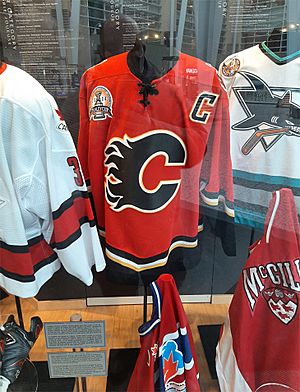
Iginla's sweater used during game 6 of the 2004 Stanley Cup Finals at the Hockey Hall of Fame.
|
Images for kids
-
Iginla in March 2014 with the Boston Bruins
See also
 In Spanish: Jarome Iginla para niños
In Spanish: Jarome Iginla para niños
 | William L. Dawson |
 | W. E. B. Du Bois |
 | Harry Belafonte |


